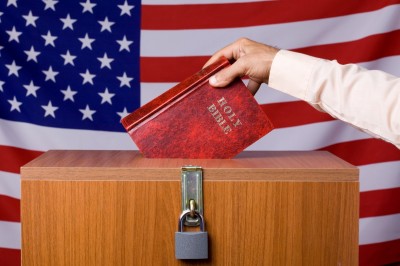How much influence, if any, should the Bible have on American public policy?

There is a wide divergence in the answer to the above question, depending on who is asked.
Last week, Pew Research Center reported on such differences. They write about those on the right: “Most Trump supporters (69%) would like the Bible to have at least some influence on the laws of the U.S., including 36% who say it should have ‘a great deal’ of influence.”
As to those on the left, Pew writes, “About seven-in-ten Biden supporters (69%) say the Bible should have little or no influence on the laws of the U.S., including 53% who say it should have no influence.”
Gary Bauer, who served in the Reagan administration and now runs American Values, reacted to this survey: “Why does this matter?... And as we are seeing now with the absurd smears of ‘Christian nationalism,’ those who say the Bible should have no influence quickly morph their religious bigotry into the belief that Christians are ‘a danger to democracy.’”
And Bauer adds, “Once again, pastors and Christians who say, ‘I’m not interested in politics because it’s divisive,’ are sorely mistaken. The government and the neo-Marxist left are very interested in you!”
One key issue is: What is the source of our rights? God or government?
Rabbi Daniel Lapin, president of the American Alliance of Jews and Christians, told me once in a television interview: “There is obviously in today's society, a very strong desire to suggest that the rights enjoyed by citizens are graciously granted by government.” And he went on to say that what the government grants, it can also take away.
The rabbi continued, “And it is precisely for that reason that anybody who spends the slightest amount of effort on finding out what the founders of the United States of America believed will know that they stressed and emphasized constantly and reliably, that these rights were from God. They were God given, not government given.”
What did the founders of America have to say about such matters? How much influence should the Bible have on the nation’s laws, if any?
Well, for starters, the Bible is the source of the notion of covenant, which ultimately gave rise to our governing document, the Constitution. And many scholars, like the late Dr. Donald S. Lutz, of the University of Houston, have noted the vital role of the biblical concept of covenant in helping to frame our two key founding documents, the Declaration of Independence and the Constitution. Both of which have the same structure: A written agreement under God that bears signatures.
Writes Lutz in his classic book, The Origins of American Constitutionalism: “The American constitutional tradition derives in much of its form and content from the Judeo-Christian tradition as interpreted by the radical Protestant sects to which belonged so many of the original European settlers in British North America.” And their chief guidebook was the Bible.
Lutz adds, “God is called on as a witness to the agreement … Wherever dissenting Protestantism went, so too went their church covenants.” And those church covenants eventually morphed into political agreements. The Mayflower Compact is one such example.
No wonder Newsweek wrote on the eve of the Year of the Bible: “Now historians are discovering that the Bible, perhaps even more than the Constitution, is our founding document: the source of the powerful myth of the United States as a special, sacred nation, a people called by God to establish a model society, a beacon to the world.”
The Scriptures teach the sinfulness of man, so the founders carefully separated political power to avoid tyranny. As Alexander Hamilton, a New York representative at the Constitutional convention, once noted on man’s corrupt nature: “Till the millennium comes, in spite of all our boasted light and purification, hypocrisy and treachery will continue to be the most successful commodities in the political market.”
Another point of the founders’ view is that for self-rule to work, the people must be virtuous. How could they maintain virtue? Through the voluntary free exercise of religion, which usually meant Christianity in one version or another.
As George Washington famously worded it: “Of all the dispositions and habits which lead to political prosperity, religion and morality are indispensable supports.”
Lutz comments on how important the idea of virtue was to the founders of America, and, of course, the Bible was their basis for virtue: “Without the belief in a virtuous people, the federal republic would not have been tried.”
It’s amazing that millions of Americans today think that the Bible should have no place in influencing public policy. The Bible helped produce the freest and most prosperous country in world history. As President Andrew Jackson declared, “The Bible is the rock on which this Republic rests.”
Jerry Newcombe, D.Min., is the executive director of the Providence Forum, an outreach of D. James Kennedy Ministries, where Jerry also serves as senior producer and an on-air host. He has written/co-written 33 books, including George Washington’s Sacred Fire (with Providence Forum founder Peter Lillback, Ph.D.) and What If Jesus Had Never Been Born? (with D. James Kennedy, Ph.D.). www.djkm.org? @newcombejerry www.jerrynewcombe.com



























